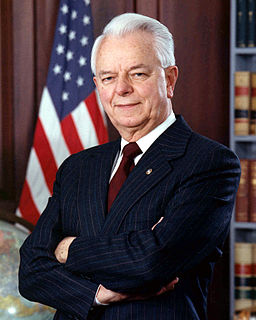A Quote by John C. Calhoun
The framers of our constitution had the sagacity to vest in Congress all implied powers: that is, powers necessary and proper to carry into effect all the delegated powers wherever vested.
Related Quotes
I consider the foundation of the Constitution as laid on this ground that 'all powers not delegated to the United States, by the Constitution, nor prohibited by it to the states, are reserved to the states or to the people.' To take a single step beyond the boundaries thus specially drawn around the powers of Congress, is to take possession of a boundless field of power not longer susceptible of any definition.
What is to be the consequence, in case the Congress shall misconstrue this part [the necessary and proper clause] of the Constitution and exercise powers not warranted by its true meaning, I answer the same as if they should misconstrue or enlarge any other power vested in them . . . the success of the usurpation will depend on the executive and judiciary departments, which are to expound and give effect to the legislative acts; and in a last resort a remedy must be obtained from the people, who can by the elections of more faithful representatives, annul the acts of the usurpers.
I believe that the power to declare war is most important in limiting the powers of the national government in regard to the rights of its citizens, but that it does not require Congress to give its approval before the president uses force abroad. I do not believe that the framers of the Constitution understood the power to declare to mean "authorize" or "commence" war. That does not mean that the separation of powers or checks and balances will not work.
The constitution has divided the powers of government into three branches, Legislative, Executive and Judiciary, lodging each with a distinct magistracy. The Legislative it has given completely to the Senate and House of Representatives. It has declared that the Executive powers shall be vested in the President, submitting special articles of it to a negative by the Senate, and it has vested the Judiciary power in the courts of justice, with certain exceptions also in favor of the Senate.
Over the longer term, the institutions and powers of the EU will continue to expand and certain policymaking powers, heretofore vested in the member states, will be delegated or transferred to, or pooled and shared with EU institutions. As a result, the sovereignty of the member states will increasingly be eroded.
Article I, Section 8, of the Constitution, of course, lays out the delegated, enumerated, and therefore limited powers of Congress. Only through a deliberate misreading of the general welfare and commerce clauses of the Constitution has the federal government been allowed to overreach its authority and extend its tendrils into every corner of civil society.
In explaining the Constitution, James Madison, the acknowledged father of the Constitution, wrote in Federalist Paper 45: 'The powers delegated by the proposed Constitution to the Federal government are few and defined. Those which are to remain in the State governments are numerous and indefinite. The former will be exercised principally on external objects, as war, peach, negotiation, and foreign commerce.' Has the Constitution been amended to permit Congress to tax, spend and regulate as it pleases or have Americans said, 'To hell with the Constitution'?
When great powers fade, as they inevitably must, it's normally for one of two reasons. Some powers exhaust themselves through overreach abroad, underinvestment at home, or a mixture of the two. This was the case for the Soviet Union. Other powers lose their privileged position with the emergence of new, stronger powers.
I acknowledge, in the ordinary course of government, that the exposition of the laws and Constitution devolves upon the judicial. But I beg to know upon what principle it can be contended that any one department draws from the Constitution greater powers than another in marking out the limits of the powers of the several departments.
I, sir, have always conceived - I believe those who proposed the constitution conceived,and it is still more fully known, and more material to observe, those who ratified the constitution conceived, that this is not an indefinite government deriving its powers from the general terms prefixed to the specified powers - but, a limited government tied down to the specified powers, which explain and define the general terms.







































